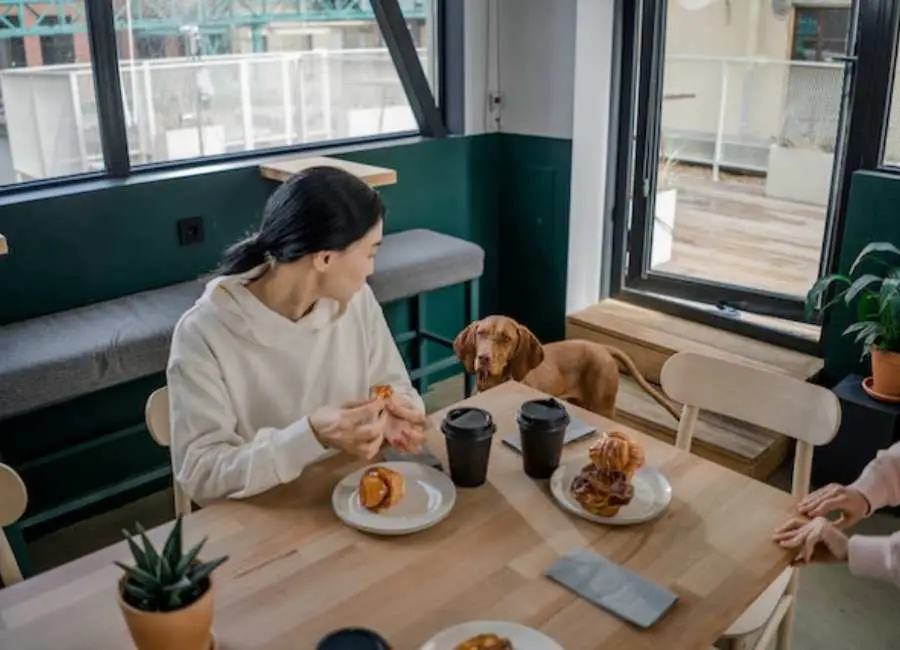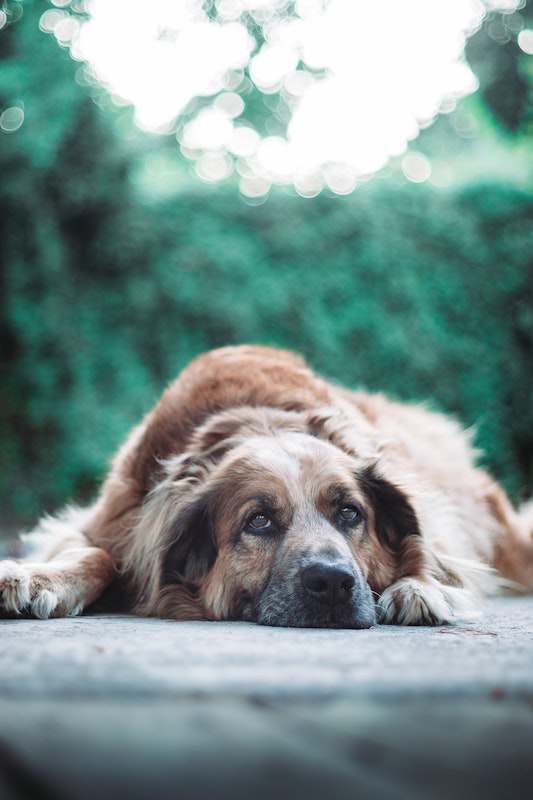10 Reasons For An Older Dog Not Eating & Tips

Let’s discuss older dog not eating…
Is your furry friend starting to turn their nose up at mealtime? If you have an older dog who’s suddenly become a picky eater, you’re not alone. We know how worrying it can be to see your canine companion lose interest in their food. But fear not, because we’ve got some tail-wagging tips to help you get that appetite back on track!
From understanding the reasons behind their finicky behavior to tantalizing their taste buds with exciting new flavors, we’ve got your four-legged pal covered. Ready to make mealtime mouthwatering again? Let’s dig in!
Reasons For An Older Dog Not Eating

The following are some common reasons for an older dog not eating:
1. Dental Issues
As dogs age, dental problems like gum disease, fractured teeth, or mouth sores can become more prevalent. These issues make chewing painful, leading to a loss of appetite. Regularly check your dog’s teeth and gums for any signs of redness, swelling, or bad breath.
To address this, schedule routine dental check-ups with your veterinarian. Soften your dog’s food by soaking it in warm water, or opt for canned food that is easier to chew. If necessary, your vet might recommend a dental cleaning or extractions.
2. Reduced Sense of Smell
Aging can be a bit of a scent spoiler. Your dog’s sense of smell might not be as sharp as it once was, impacting their excitement for mealtime. To combat this, employ a little culinary magic.
Gently warming their food releases enticing aromas that can rekindle their appetite. Another trick is to sprinkle tasty toppers – like a dollop of dog-friendly broth – over their food to awaken their senses.
3. Change in Routine
Older dogs thrive on routine and can become stressed by sudden changes. Moving to a new home, a family member leaving, or a shift in their daily schedule can disrupt their eating habits.
To help them feel more comfortable, establish a consistent daily routine. Feed them at the same time each day and try to keep their environment stable. This can reduce anxiety and encourage them to eat regularly.
4. Medication Side Effects
Ever read those lengthy medication pamphlets with a list of potential side effects? Well, our furry pals can experience similar effects, including nausea or altered taste perceptions.
If you suspect that your dog’s medication is putting a damper on their appetite, consult your vet. They might adjust the dosage or recommend alternative medications to keep your pup feeling peppy about food.
Learn more about Amantadine’s side effects in dogs.
5. Underlying Pain
Chronic pain from conditions like arthritis or joint issues can make eating uncomfortable for older dogs. Look for signs of stiffness, limping, or reluctance to move.
Your vet can suggest pain management strategies, including anti-inflammatory medications, physical therapy, or acupuncture. Managing your dog’s pain can make mealtime more enjoyable and encourage them to eat.
6. Anxiety or Stress

Just like us, dogs can have moments of anxiety or stress. Thunderstorms, separation anxiety, or a series of loud noises from a home renovation escapade can lead to a diminished appetite.
It’s like trying to dine at a fancy restaurant while a marching band parade by! To ease their worries, create a zen-like dining ambiance. You can play soothing music or introduce interactive toys to help shift their focus from anxiety to appetite.
7. Cognitive Dysfunction
Cognitive decline, similar to dementia in humans, can cause confusion and forgetfulness in older dogs. This can affect their ability to recognize food or mealtimes.
Provide mental stimulation through interactive toys that dispense treats or puzzle feeders. Your vet might recommend supplements containing antioxidants and fatty acids to support cognitive function.
8. Dietary Preferences
As dogs age, their taste preferences may change. What they once loved, they might now turn their nose up at. Experiment with different types of high-quality, nutritious foods to discover what your dog prefers.
Ensure that the chosen diet meets their nutritional requirements and consult your vet if you’re considering a significant dietary change.
9. Poor-Quality Food
Imagine if you were served bland, uninspiring meals day after day – you’d probably lose interest too. As dogs age, their nutritional requirements can evolve.
Make sure you’re serving them high-quality, age-appropriate grub. Consult your vet to discuss dietary options that cater to their senior status and potential health needs.
10. Underlying Health Conditions
Sometimes, a lack of appetite might be your dog’s subtle way of signaling an underlying health concern. Conditions like kidney disease, arthritis, or thyroid issues could be at play. This is where your trusted vet steps in as the detective.
Regular wellness check-ups are vital to detect and manage these issues early. Tailoring their diet and introducing supplements might be necessary to cater to their specific health needs.
How to address an older dog not eating

When an older dog stops eating, it can be concerning for pet owners. However, there are several common ways to address this issue and encourage your older dog to eat:
1. Check for Illness or Medical Issues
The first step in addressing an older dog not eating is to rule out any underlying medical conditions or illnesses that could be causing the loss of appetite. It’s important to take your dog to the veterinarian for a thorough examination to determine if there are any health issues that need to be addressed.
2. Evaluate Dental Health
Dental problems, such as tooth decay or gum disease, can make eating uncomfortable for older dogs. Check your dog’s teeth and gums for any signs of dental issues. If you notice any abnormalities, speak to your veterinarian about appropriate dental care, including professional cleaning if necessary.
3. Try Different Food
Sometimes, older dogs may become picky eaters or lose interest in their regular food. Experiment with different types and flavors of dog food to see if your dog shows more interest in one particular option. You can also try warming the food or adding a small amount of low-sodium chicken broth to enhance the flavor.
4. Feed Smaller, Frequent Meals
Rather than serving one or two large meals, try feeding your older dog smaller and more frequent meals throughout the day. This can help stimulate their appetite and make mealtime more manageable if they are struggling to eat larger portions.
5. Enhance the Aroma of the Food
Dogs have a strong sense of smell, and sometimes enhancing the aroma of their food can entice them to eat. You can try topping the food with a small amount of wet food or adding low-sodium chicken broth, which can release appetizing smells that may encourage your dog to eat.
6. Provide a Quiet and Calm Eating Environment
Creating a peaceful and stress-free eating environment can be beneficial for older dogs. Ensure that the area where your dog eats is quiet, comfortable, and free from distractions. This can help reduce any anxiety or stress that may be affecting their appetite.
7. Consider Hand Feeding or Food Puzzle Toys
Some older dogs may respond positively to hand feeding, where you offer small bites of food from your hand. Additionally, food puzzle toys or interactive feeding devices can help stimulate your dog’s interest in food and make mealtimes more engaging.
8. Monitor Water Intake
Make sure your older dog has access to fresh water at all times. Dehydration can contribute to appetite loss, so it’s important to ensure that your dog stays hydrated. Consider providing multiple water sources throughout your home to make it easily accessible.
9. Behavioral Enrichment and Exercise
Providing mental and physical stimulation through activities and exercise can also help improve your dog’s appetite. Engage in activities that your dog enjoys, such as short walks, gentle play, or puzzle games. This can enhance their overall well-being and potentially increase their appetite.
Learn more about keeping older dogs healthy.
Related Questions
Can dental problems be a reason for my older dog’s decreased appetite?
Absolutely. Dental issues, such as tooth decay, gum disease, or oral pain, can significantly impact your dog’s eating habits. If your dog shows signs of discomfort while chewing or has bad breath, dental problems may be the culprit. Regular dental check-ups by a veterinarian and maintaining good oral hygiene can help prevent dental issues and keep your older dog’s mouth healthy.
My older dog’s decreased appetite is accompanied by other concerning symptoms. Should I be worried?
If your older dog’s lack of appetite is accompanied by other worrisome symptoms, such as lethargy, weight loss, vomiting, or diarrhea, it’s crucial to seek veterinary attention promptly. These symptoms may indicate an underlying health issue that requires medical intervention. Your veterinarian will be able to conduct a thorough examination and run any necessary tests to determine the cause and provide appropriate treatment.
Can stress or anxiety cause my older dog to lose his appetite?
Yes, stress and anxiety can indeed affect your older dog’s appetite. Major changes, such as the addition of a new family member, a move to a different home, or the loss of a companion, can trigger stress in dogs, leading to a decreased appetite. Ensure your dog has a quiet and secure space where they can relax, and try to maintain a routine to provide a sense of stability. If the stress persists, consult with your veterinarian for guidance on managing anxiety in older dogs.
Learn more about identifying an older dying dog.
Is it normal for older dogs to eat less as they age?
Yes, it’s normal for older dogs to eat less as they age. As dogs get older, their metabolism slows down, and their energy requirements decrease. However, it’s essential to monitor their weight and overall health. Sudden and significant changes in your dog’s eating habits should not be ignored, as they may indicate an underlying health issue. Regular veterinary check-ups and open communication with your veterinarian can help ensure your older dog’s nutritional needs are being met.
My older dog has suddenly stopped eating. What could be the reason?
There can be various reasons why an older dog may stop eating. It could be due to dental issues, medical conditions, medication side effects, or even changes in their environment. If your dog has stopped eating for more than 24 hours or shows other concerning symptoms, it’s best to consult with your veterinarian for a proper diagnosis and appropriate treatment.
Learn more about older dogs coughing after drinking water.
Conclusion
In conclusion, when you notice your older furry friend isn’t quite as eager to chow down, it can certainly be concerning. However, it’s important not to panic right away. Remember to consider factors such as dental issues, changes in appetite, and potential health concerns.
Consulting with your veterinarian is crucial to identify any underlying problems and determine the best course of action. Incorporating tasty and nutritious meals, along with plenty of love and patience, can go a long way in helping your older dog regain their appetite and enjoy mealtimes once again.
Take care of your loyal companion and remember, sometimes it’s just a matter of finding the perfect recipe to satisfy their sophisticated taste buds.
